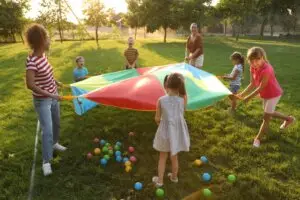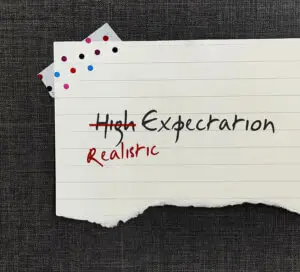Encourage Physical Activity and Movement with Children
June 24, 2024

This blog is part of a series on Fostering Healthy Minds in Children at Church that provides strategies children’s leaders can use to foster healthy minds in children to whom they minister. And, hey, you may even pick up a tip or two to help those in your personal circles! If you’re new to the series, we encourage you to check out the introduction here.
Talk about an endorphin boost! Keeping kids active is important to both their physical and mental well-being. While your Wednesday night meetings are not supposed to be an extra PE class, we can most definitely add in some physical movement to increase kids’ focus, attention, enjoyment, and happy brain chemicals.
First and foremost, we need to make sure we are not focusing on children’s weight and appearance. Adding in physical activity during your meeting times is only for structure and fun. If kids ask, tell them exercise and activity helps keep our minds and bodies focused and adds a little fun to the routine!
So, how can we make this happen?
Use Extra Activities Provided in Missions Journey: Kids Leader
When preparing your lesson and deciding what to do during your meeting time, review what is already in the curriculum. There is usually (although not always) an active game during the opening and at least one other during the meeting time. You can always check the “Extra Activities” at the end of each lesson in Missions Journey: Kids Leader to see if there are other game ideas. Was there a game from a previous week you played that children enjoyed? Make a note to include it again!
Find Brain Break Ideas Online
I also love structuring in a few “brain breaks” any time my group has been sedentary for a while. If a lesson has been heavy on discussion and activities in Missions Journey: Kids Adventure, make space for a “brain break.”
If you search “brain breaks” on YouTube, you will plenty of resources for active engagement activities that are only a few minutes long. Find four or five that best fit your group, and rotate them each week. Reminder: Always preview anything you plan to show kids!
A Few Ideas to Get You Started
It’s a good idea to have several quick and easy activities on hand to get kids up and moving, especially if they seem bored or distracted during your meeting. Here are some other ideas to try if you want an easy activity that doesn’t involve technology:
- A good game of four corners is always a hit. In this game, label each corner of your meeting space with an idea or response and instruct kids to run to whatever corner they identify with most. If you want to play the game purely for fun, label each corner 1–4 and choose one child to close his eyes. The other children will pick a corner. The child whose eyes are closed will then call out a number, and whoever is in that corner is out. The kids then swap corners and continue until there is only one person left. Speed up the pace to make it a little crazy!
- Another kid favorite is “Touch Blue,” where the leader says a color and children have to touch something in the room that is that color. It’s as simple as that!
- Create a gift bag of physical challenges (10 jumping jacks, 15 mountain climbers, 5 burpees, etc.). When a child correctly answers a review question, let them draw a physical challenge. Watch out — you may have everyone joining in!
- If you need a more relaxing vibe, lead some light stretching exercises as a group.
- My all-time favorite idea is soliciting ideas from the group on quick activities they would like to do! You can even let a child lead the activity every now and then (see “The Why and How of Giving Kids Choices in the Classroom”).
Brooklyn Hancock is a Licensed Mental Health Counselor, Registered Play Therapist, mom, and former Certified School Counselor. Her passions are working with children, adolescents, teens, adults, and parents to navigate life’s toughest challenges.
Disclaimer: The information shared on wmu.com is not meant to diagnose or treat a mental health condition. We encourage you to follow up with your health-care provider and seek a mental health professional for individual consultation and care.













